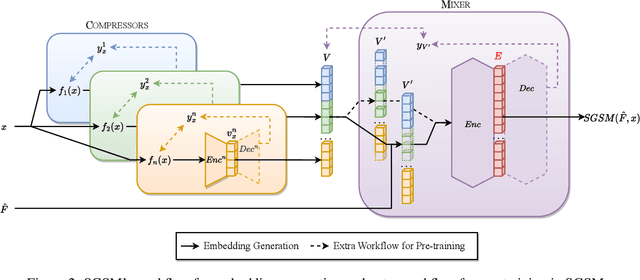Tianjian Yang
Generalized probabilistic canonical correlation analysis for multi-modal data integration with full or partial observations
Apr 15, 2025Abstract:Background: The integration and analysis of multi-modal data are increasingly essential across various domains including bioinformatics. As the volume and complexity of such data grow, there is a pressing need for computational models that not only integrate diverse modalities but also leverage their complementary information to improve clustering accuracy and insights, especially when dealing with partial observations with missing data. Results: We propose Generalized Probabilistic Canonical Correlation Analysis (GPCCA), an unsupervised method for the integration and joint dimensionality reduction of multi-modal data. GPCCA addresses key challenges in multi-modal data analysis by handling missing values within the model, enabling the integration of more than two modalities, and identifying informative features while accounting for correlations within individual modalities. The model demonstrates robustness to various missing data patterns and provides low-dimensional embeddings that facilitate downstream clustering and analysis. In a range of simulation settings, GPCCA outperforms existing methods in capturing essential patterns across modalities. Additionally, we demonstrate its applicability to multi-omics data from TCGA cancer datasets and a multi-view image dataset. Conclusion: GPCCA offers a useful framework for multi-modal data integration, effectively handling missing data and providing informative low-dimensional embeddings. Its performance across cancer genomics and multi-view image data highlights its robustness and potential for broad application. To make the method accessible to the wider research community, we have released an R package, GPCCA, which is available at https://github.com/Kaversoniano/GPCCA.
SGSM: A Foundation-model-like Semi-generalist Sensing Model
Jun 15, 2024



Abstract:The significance of intelligent sensing systems is growing in the realm of smart services. These systems extract relevant signal features and generate informative representations for particular tasks. However, building the feature extraction component for such systems requires extensive domain-specific expertise or data. The exceptionally rapid development of foundation models is likely to usher in newfound abilities in such intelligent sensing. We propose a new scheme for sensing model, which we refer to as semi-generalist sensing model (SGSM). SGSM is able to semiautomatically solve various tasks using relatively less task-specific labeled data compared to traditional systems. Built through the analysis of the common theoretical model, SGSM can depict different modalities, such as the acoustic and Wi-Fi signal. Experimental results on such two heterogeneous sensors illustrate that SGSM functions across a wide range of scenarios, thereby establishing its broad applicability. In some cases, SGSM even achieves better performance than sensor-specific specialized solutions. Wi-Fi evaluations indicate a 20\% accuracy improvement when applying SGSM to an existing sensing model.
 Add to Chrome
Add to Chrome Add to Firefox
Add to Firefox Add to Edge
Add to Edge